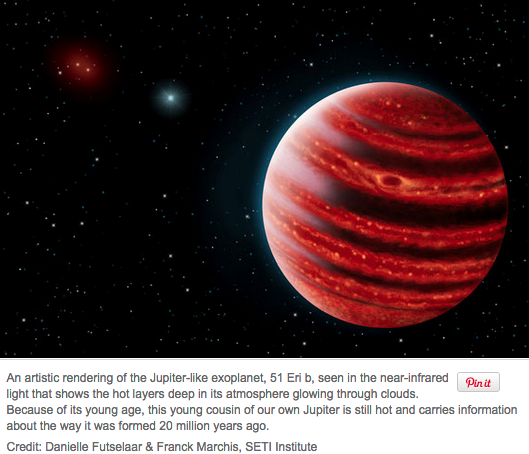Astronomers discover ‘young Jupiter’
MIAMI–Astronomers have discovered a planet 100 light years away that looks a lot like Jupiter once did and may offer new insights on how planets are formed, researchers said Thursday.
Known as 51 Eridani b, it is the first exoplanet detected by a new instrument called the Gemini Planet Imager (GPI), according to the report in the journal Science.
It is “the first young planet that probably looks like Jupiter did billions of years ago, making it currently our most important corner-piece of the planet formation jigsaw puzzle,” said Travis Barman, an associate professor of planetary sciences at the University of Arizona.
The star it circles, 51 Eridani, is just 20 million years old — fairly young considering the Sun is about 4.5 billion years old.
Enshrouded in methane, the planet is about twice the mass of Jupiter — the largest planet in our solar system — and contains the strongest methane signature ever detected in the atmosphere of an alien planet.
Its temperature is estimated to be about 800 degrees Fahrenheit (427 Celsius), hot enough to melt lead.
“This is exactly the kind of planet we envisioned discovering when we designed GPI,” said James Graham, a University of California, Berkeley professor of astronomy and the GPI project scientist.
“We wanted to find planets when they’re young so we can figure out the formation process.”
The Gemini Planet Imager was designed to discover faint, young planets orbiting bright stars.
The instrument is about the size of a small car and is mounted on the eight-meter (yard) Gemini South telescope in Chile. It began operating in December 2014.
A separate NASA mission known as the Kepler space telescope searches for planets by studying the dim in starlight that can be glimpsed when a planet passes in front of a star.
Kepler’s main goal is to find Earth-like planets that might be able to support life.















